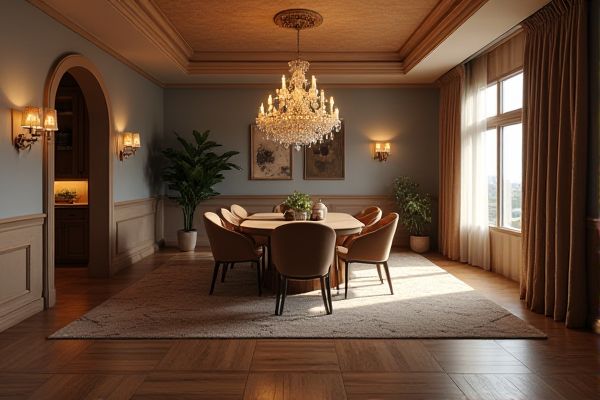
Chandelier lighting offers a grand, decorative centerpiece ideal for large spaces, while pendant lighting provides focused illumination perfect for task areas or smaller rooms. Explore the differences to discover which lighting option best enhances your home's ambiance.
Table of Comparison
| Feature | Chandelier | Pendant Lighting |
|---|---|---|
| Design | Multi-arm, ornate, traditional or modern | Single or multi-light fixtures, sleek and minimalistic |
| Size | Large, statement piece for spacious areas | Compact to medium, adaptable for various spaces |
| Lighting Coverage | Wide, ambient illumination | Focused or ambient, depending on design |
| Installation | Ceiling-mounted, often requires professional setup | Ceiling-mounted, easier installation |
| Cost | Typically higher due to size and complexity | Generally more affordable and versatile |
| Best Use | Dining rooms, foyers, large living rooms | Kitchens, over countertops, small to medium rooms |
Understanding Chandelier and Pendant Lighting
Chandeliers and pendant lighting both serve as stylish focal points but differ in design and function; chandeliers typically feature multiple arms and lights, creating an elegant and dramatic effect, while pendant lights consist of a single fixture hanging from the ceiling, offering a more minimalistic and versatile look. Your choice depends on the space size and ambiance desired, with chandeliers ideal for large areas like dining rooms and pendants suitable for task lighting or smaller spaces. Understanding these differences helps you select lighting that complements your interior design and enhances room functionality.
Key Differences Between Chandeliers and Pendant Lights
Chandeliers typically feature multiple arms or branches with several light bulbs arranged in a decorative design, providing a grand and elegant lighting focal point ideal for large spaces or formal dining rooms. Pendant lights usually consist of a single light fixture suspended from the ceiling, offering a more focused and streamlined illumination suited for task lighting or smaller areas like kitchen islands or entryways. Your choice between chandeliers and pendant lights depends on the desired ambiance, room size, and lighting needs, balancing style with functionality.
Pros and Cons of Chandelier Lighting
Chandelier lighting offers an elegant focal point with multiple light sources that enhance ambient illumination and add a touch of luxury to any room. Its design versatility ranges from traditional crystal styles to modern minimalist forms, but chandeliers often require higher ceilings and more maintenance due to dusting and bulb replacement. While chandeliers create a dramatic and sophisticated atmosphere, they may not suit every space or budget, making pendants a more flexible alternative for smaller areas or casual settings.
Pros and Cons of Pendant Lighting
Pendant lighting offers focused illumination ideal for task-oriented spaces like kitchen islands and reading nooks, enhancing both functionality and style. Its versatility allows for adjustable height and wide design options, but may lack the grand aesthetic impact and ambient coverage provided by chandeliers. Pendant fixtures are generally easier to install and clean, though multiple units might be necessary to achieve balanced lighting in larger rooms.
Best Room Applications for Chandeliers
Chandeliers are best suited for large living rooms, dining rooms, and entryways where their intricate designs and multiple light sources create a stunning focal point and ample illumination. High ceilings enhance chandelier impact, allowing their full form to be appreciated without overwhelming the space. Your choice of chandelier can elevate the ambiance by combining both functional lighting and elegant decor.
Ideal Spaces for Pendant Lighting
Pendant lighting is ideal for kitchens, dining areas, and entryways where focused, task-oriented illumination is needed. Its versatile designs complement contemporary and minimalist decor, providing concentrated light over countertops, tables, or islands. Your choice of pendant lighting can enhance functionality while adding a stylish focal point to compact or narrow spaces.
Style and Design Variations
Chandeliers offer a grand, multi-arm design often featuring intricate details and crystal embellishments that create a luxurious and statement-making centerpiece. Pendant lighting showcases a more streamlined and versatile design, available in a wide range of shapes, sizes, and materials that cater to modern, industrial, or minimalist aesthetics. Your choice between chandelier vs pendant lighting depends on the desired ambiance and space scale, with chandeliers enhancing formal settings and pendants providing focused illumination with flexible style options.
Installation Considerations and Maintenance
Chandelier installation often requires reinforced ceiling support and professional wiring due to its heavier weight and complex design, while pendant lighting typically demands less structural support and is easier to install with adjustable hanging heights. Maintenance for chandeliers involves careful cleaning of multiple intricate components and bulbs, which can be time-consuming, whereas pendant lights generally feature simpler designs that allow for quicker dusting and bulb replacement. Choosing between these lighting options depends on the balance between aesthetic impact and ease of installation and upkeep.
Energy Efficiency: Chandeliers vs Pendant Lights
Pendant lights typically offer greater energy efficiency compared to chandeliers due to their smaller size and compatibility with LED bulbs. Chandeliers often use multiple bulbs, increasing overall energy consumption despite their elegant appearance. Your best choice depends on balancing aesthetic needs with energy-saving goals in lighting design.
Choosing the Right Lighting for Your Space
Chandeliers provide an elegant focal point with multiple light sources ideal for larger rooms or dining areas, while pendant lighting offers versatile, focused illumination perfect for task lighting in kitchens or smaller spaces. Consider ceiling height, room size, and style when selecting lighting fixtures to balance aesthetics and functionality effectively. Your choice should enhance the ambiance without overwhelming the space, ensuring optimal light distribution tailored to your needs.
 homyna.com
homyna.com